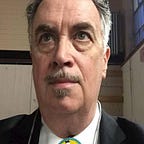PASCAL language originator Nicholas Wirth, 89
Nicholas Wirth, whose 1970 creation of the PASCAL programming language dramatically influenced the development of modern software engineering techniques, died January 1. He was 89.
A long-time professor of Informatics at the ETH Institute in Zurich, Wirth produced PASCAL primarily as a teaching tool, but its innovative language constructs set the stage for C, C++ and Java software languages that flourished in the late 20th Century, and which still have wide use today. Wirth was the winner of the 1984 ACM Turing Award, among other honors.
Wirth named the language after 15th Century philosopher and mathematician, Blaise Pascal, who is often credited as the inventor of the first digital calculator. The PASCAL language was a bridge of sorts, as it attempted to span language styles for business computing by the then-dominant COBOL language, and scientific computing as seen with the FORTRAN language.
The field of software engineering was still in its early days when Wirth began his pioneering work as a graduate student and then as assistant professor at Stanford University. At the time, the status of early hardware implementations from numerical calculators to general-purpose computers was still somewhat nascent.
It was becoming apparent this time that a language focused solely on numerical processing would encounter obstacles as computing evolved.
It was hoped, Wirth wrote in a paper, that “the undesirable canyon between scientific and commercial programming … could be bridged.” [This and other materials cited in this story appeared in ”Recollections about the Development of PASCAL,” published as part of “History of Programming Languages,” in 1996 by Addison-Wesley.]
Wirth also contributed to development of the ALGOL and MODULA languages, often bringing special focus to development of compilers that translated source software into running machine code. His book, “Algorithms + Data Structures = Programs” is often cited as a keystone text for those interested in the fundamentals of software design.
Education was the primary goal of work on PASCAL, which Wirth undertook after a disappointing experience on a somewhat squabbling committee of experts looking to standardize a new version of ALGOL 60.
In his words, Wirth decided “to pursue my original goal of designing a general-purpose language without the heavy constraints imposed by the necessity of finding a consensus among two dozen experts about each and every little detail.”
The work of Wirth and some co-conspirators built on ALGOL, but also drew implicitly on emerging thinking on structured approaches to software development, such as those outlined by E.W. Dijkstra. Certainly, the early ‘bubble gum and bailing wire’ days of computer software were receding as Wirth began his work.
“Structured programming and stepwise refinement marked the beginnings of a methodology of programming, and became a cornerstone in helping program design become a subject of intellectual respectability,” according to Wirth.
The fact that PASCAL was designed as a teaching tool is important — it was constructed in a way that allowed new programmers to learn sound method, while applying their own enhancements.
“Lacking adequate tools, build your own,” he wrote.
And, while innovation was a goal, pragmatism for Wirth was also a high-order requirement.
Wirth’s work on PASCAL started about the time he headed from Stanford to ETH Zurich, with definition of the language achieved in 1970. It was formally announced in “Communications of the ACM” in 1971. Though never the most popular language in terms of numbers, it was very influential, contributing to a movement that emphasized general applications use, strong typing and human-readable code.
PASCAL gained great currency in the early days of personal computers in the United States. A version that became known as Turbo Pascal was created by Anders Hejlsberg, and was licensed and sold by Borland International beginning in 1983. On the wings of Borland ads in Byte magazine, Turbo PASCAL became ubiquitous among desktop programmer communities.
Work of pioneers like Wirth gain special resonance today as a Generative AI paradigm appears poised to automate larger portions of the programming endeavor. Automated code generation is by no means completely new, and the surprises and ‘gotchas’ of the pioneers’ era will no doubt be revisited as the understanding of effective software development processes continues to evolve. Wirth’s words and work merit attention in this regard, and in regard as well to fuller understanding of software evolution. — J.V.
Links
https://cacm.acm.org/magazines/2021/3/250705-50-years-of-pascal/fulltext
https://www.standardpascaline.org/PascalP.html
https://amturing.acm.org/award_winners/wirth_1025774.cfm
http://PASCAL.hansotten.com/niklaus-wirth/recollections-about-the-development-of-PASCAL/
https://blogs.embarcadero.com/50-years-of-pascal-and-delphi-is-in-power/
